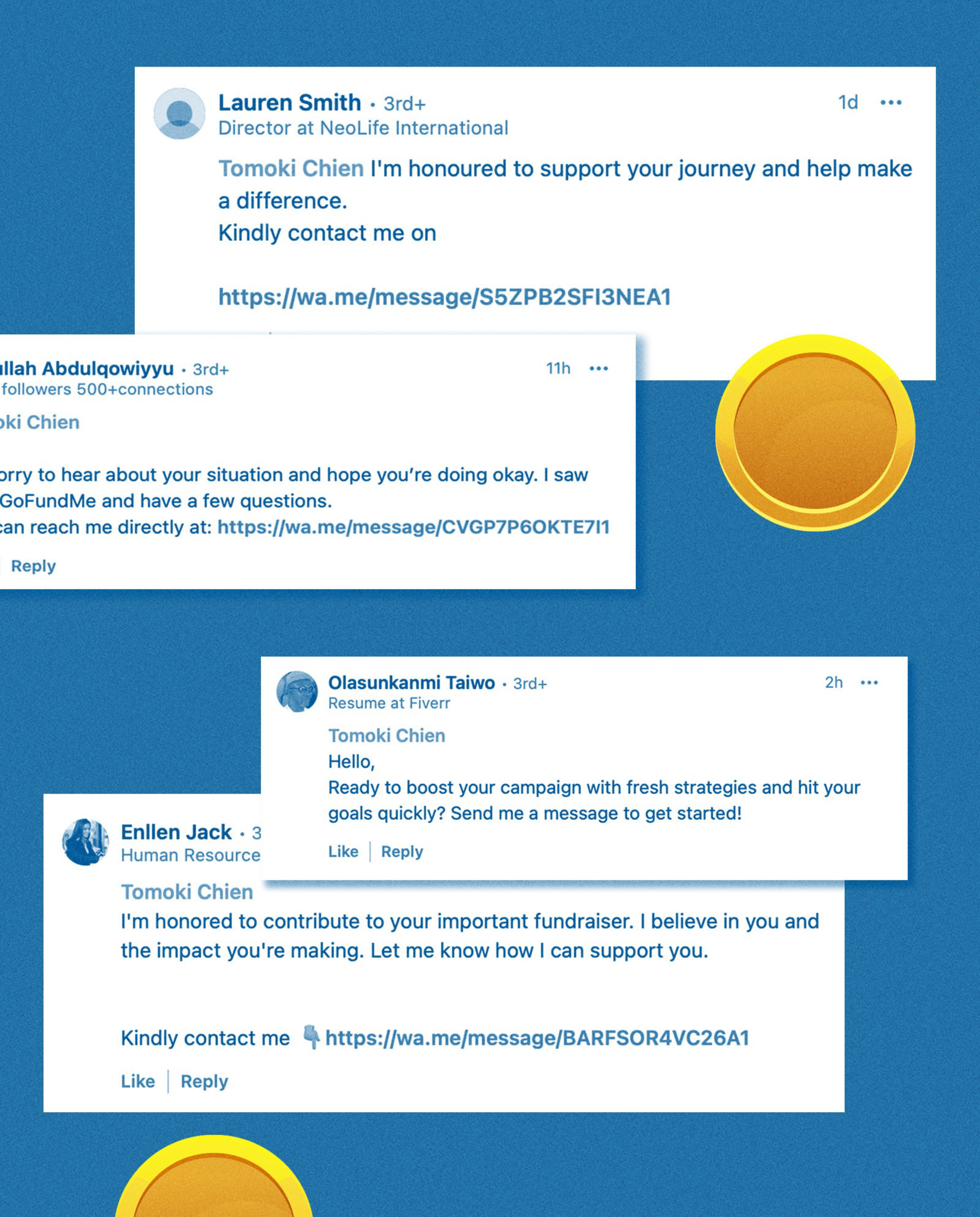It’s Super Bowl time for the disaster scammers.
As thousands flee Los Angeles’ devastating wildfires and look to rebuild, con artists are flooding LinkedIn with attempts to swindle Angelenos out of cash.
Many of the scams are crude. But based on public comments, at least some victims appeared to believe fraudsters’ promises to “support” them, and cryptocurrency wallet data show that several scammers have raised substantial sums since the fires broke out.
“Any time there is a disaster, the scammers start coming out of the woodwork,” said Reinier Nissen, a San Francisco-based scam buster who tracks online schemes.
He said he’s already seen reports of fraudsters pretending to be victims of L.A.’s wildfires, and warned that “you have to initiate and verify the information.”
His advice: If somebody’s asking you to pay in Bitcoin, it’s probably a scam. Ultimately, it’s better to err on the side of caution, he said. There’s often little recourse for people who get duped.

Representatives for the FBI, Gov. Gavin Newsom, and L.A. Mayor Karen Bass did not reply to requests for comment.
The scammers’ playbook is simple.
In a typical LinkedIn con, fraudsters try to draw victims off the platform and into WhatsApp chats, then convince them to fork over cryptocurrency in exchange for “consulting services” to help boost their GoFundMe campaigns.
"Any time there is a disaster, the scammers start coming out of the woodwork"
Reinier Nissen,<a href="https://sfstandard.com/2022/11/23/meet-the-sf-scam-buster-who-uses-a-nsfw-moniker-to-bust-grifters/" target="_blank" rel="noreferrer noopener"> a San Francisco-based scam buster</a> who tracks online schemes.
The Standard went down the rabbit hole and, after setting “bait” posts on LinkedIn, spoke by phone and text with nearly a dozen scammers who contacted the outlet.
Scammers contacted the author of any LinkedIn post with a GoFundMe link, regardless of the fundraising cause. But in several instances, posts that contained no such URL — only keywords related to the L.A. fires — garnered multiple responses from scammers.
“I’m honored to contribute to your important fundraiser,” one comment reads, linking to a WhatsApp chat. “I believe in you and the impact you’re making. Let me know how I can support you.”
The accounts often use AI-generated profile photos and list job descriptions such as “Human Resources Manager at Bitcoin Inc.” Most fire off dozens of messages, then disappear from the site within 24 hours. A LinkedIn spokesperson did not respond to a request for comment.
In multiple instances, LinkedIn users appeared not to realize they were interacting with fraudsters.
“Thanks so much :),” one user replied to a scammer. “I just opened the fundraiser this morning so that’s great timing!”
Once on WhatsApp, all the fraudsters began by asking for a link to their new client’s GoFundMe campaign. They generally trashed the campaign’s fundraising progress and offered to help achieve its goals within “a short and winkle of time.”
In each instance, The Standard sent scammers the link to GoFundMe’s official wildfire relief fund (opens in new tab), which has raised $3 million. Still, they said, for the “cheap” price of hundreds of dollars, they could improve the subpar progress and help raise millions more.
Prices for “consulting” packages ranged from $70 to $500, though The Standard managed to haggle several 10% discounts.
To confirm one scam, The Standard took fraudster “Lauren” up on her offer. A day later, she sent a bogus list of “top donors,” including contacts for Queens University Canada and the BBC. She then asked for an additional $100 to create a “crowdfunding professional video.”
Lauren appeared to belong to a network of Nigerian scammers who followed a similar script, sent links to the same website (opens in new tab), and offered similar services. All had Nigerian phone numbers and said they lived in that country.
Several others who commented on LinkedIn test posts appeared to belong to different networks, including one that used U.S.-based phone numbers and pretended to represent the nonprofit GlobalGiving. A spokesperson for the organization confirmed that the communique was not authentic.
The Standard obtained a cryptocurrency wallet address (opens in new tab) for one of the scammers in Lauren’s Nigerian network. It had received $4,000 over six months — $600 of that since the outbreak of L.A.’s fires. Another fraudster, who appeared to belong to a separate network, had raised nearly $2,000 (opens in new tab), all before the fires broke out.
The fact that some scammers reacted specifically to wildfire-related keywords in LinkedIn posts could indicate that they, or their coordinators, are targeting the L.A. victims. But when questioned by phone, few appeared to know what or where Los Angeles is, or even what The Standard was purporting to raise money for.
At times, the scams veered far into absurdity.
The Standard asked Lauren if she knew “Abdullah,” who appeared to belong to her network.
“He’s a scammer!” Lauren immediately replied. “I’m going to report it to the Nigerian government.” She promised to also file a complaint with the FBI.
Abdullah did not take kindly to the news.
“That’s insane!” Abdullah said. “I feel betrayed. After this, I’m going to call her. I’m going to tell her, ‘You know me.’” He continued to describe her as a “mean woman” and insisted that he’d seen her in the office that day.
The Standard sent both their phone numbers to the FBI.
If you or someone you know has been a victim of a scam or fraud scheme, report it to ic3.gov (opens in new tab), the FBI’s Internet Crime Complaint Center.